Conures are colorful and playful parrots that make great pets for bird lovers. They are known for their intelligence, personality, and ability to mimic sounds. However, conures also have unique behaviors that may puzzle or concern their owners. One of these behaviors is head bobbing.
Head bobbing is a common and normal behavior for conures and many other parrot species. It involves moving the head up and down rapidly, sometimes accompanied by vocalizations or other body movements. But what does it mean when a conure bobs its head? And how can you tell if it is a sign of a problem?
This article will explore Conure Head Bobbing – Symptoms, Causes, And Treatment.
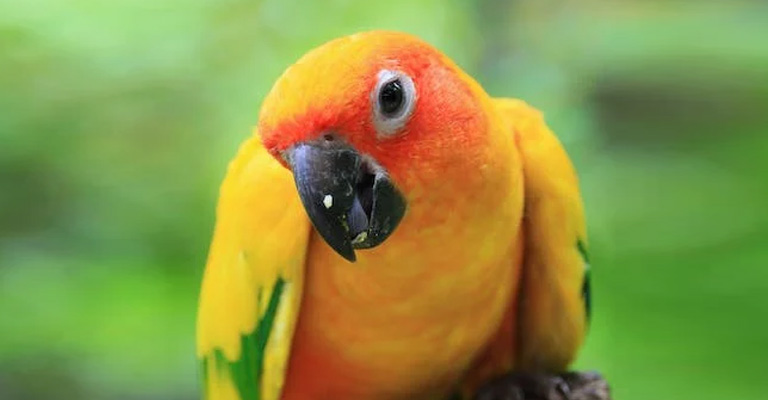
Conure Head Bobbing – Symptoms
Here are some potential symptoms of conure head bobbing-
Repetitive Up-And-Down Head Movements
One of the primary symptoms of conure head bobbing is the repetitive up-and-down movement of the head. This bobbing motion is typically rhythmic and noticeable. It may appear as though the conure is consistently nodding its head.
Vocalizations
In addition to head bobbing, conures may accompany this behavior with specific vocalizations. These vocalizations can vary from chirping and tweeting to squawking or making soft cooing sounds. The vocalizations are often synchronized with the head-bobbing motion.
Body Movements
Some conures exhibit synchronized body movements along with head bobbing. These movements include lifting their wings partially or entirely, hopping up and down on their perches, or engaging in coordinated body sways. The body movements are usually in sync with the head bobbing rhythm.
Altered Behavior
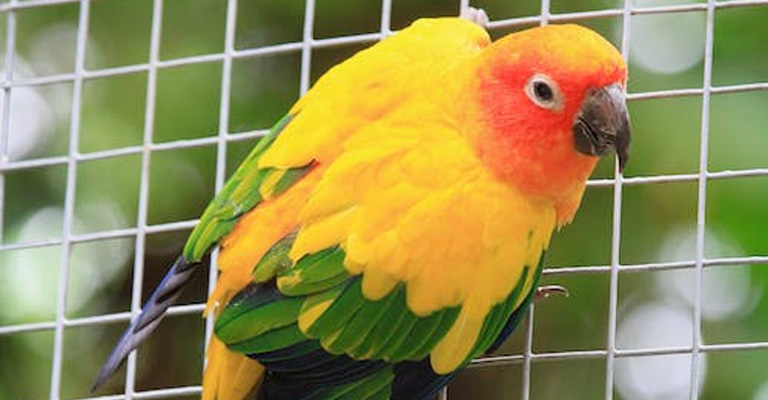
Head bobbing can cause changes in a conure’s behavior. Owners may notice decreased appetite, increased irritability, or restlessness in their birds.
The conure may become more agitated or exhibit discomfort during head bobbing episodes. These behavioral changes are critical indicators to consider when assessing the overall health of the conure.
Duration And Frequency
The duration and frequency of head-bobbing episodes can also provide valuable information. Typical head bobbing attacks in conures are brief and intermittent, often occurring during excitement or communication.
However, if the head bobbing becomes persistent and occurs frequently throughout the day, it may cause concern and warrant further investigation.
Observation Of Other Symptoms:
Observing any additional symptoms that may accompany head bobbing in conures is essential. These symptoms include feather appearance or quality changes, breathing difficulties, abnormal feces, weight loss, or decreased activity level.
Alongside head bobbing, these symptoms may indicate an underlying health issue requiring veterinary attention.
Conure Head Bobbing – Causes
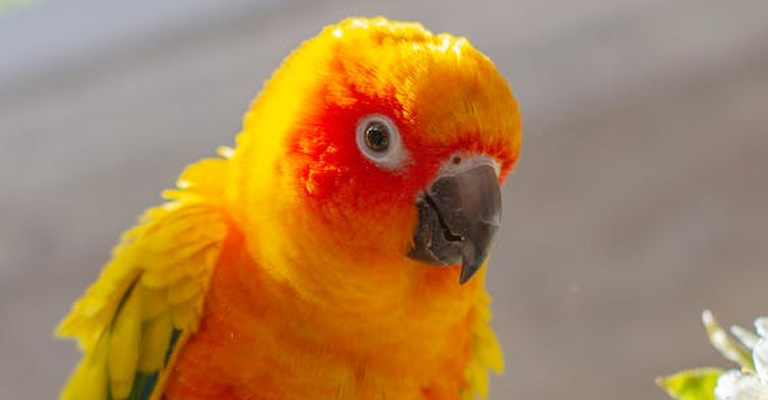
Here are some potential causes of conure head bobbing-
Communication And Excitement
One of the primary reasons conures engage in head bobbing is communication and excitement. Conures are social creatures with heads bobbing to convey emotions and interact with their environment. During moments of excitement or anticipation, conures may nod their heads rhythmically as a form of expression.
Hormonal Changes
Hormonal fluctuations can also contribute to head bobbing in conures. During breeding seasons or when hormones are elevated, conures may exhibit head bobbing as part of their courtship behavior. This behavior serves as a way for them to attract potential mates or establish their territory.
Nervousness Or Stress
Head bobbing can also respond to nervousness, anxiety, or stressful situations. Conures may bob their heads to cope with unfamiliar environments, loud noises, or changes in routine. It can be a self-soothing mechanism employed by the bird to alleviate stress.
Nutritional Deficiencies
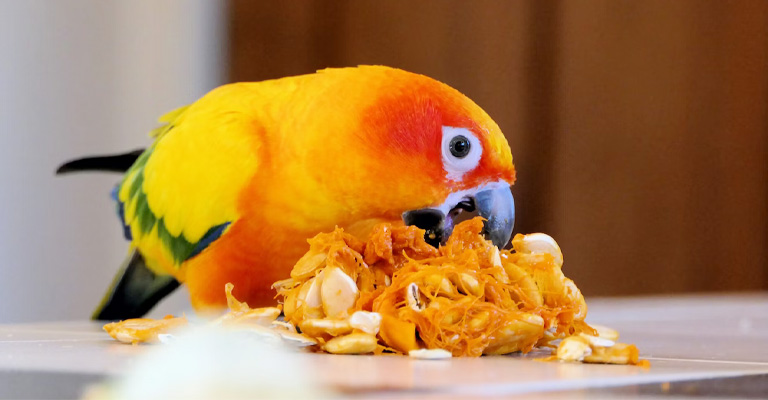
Inadequate nutrition or imbalanced diets can result in nutritional deficiencies that affect the bird’s overall health. This can manifest as head bobbing, among other abnormal behaviors.
Neurological Disorders
Certain neurological conditions or abnormalities in the brain can trigger involuntary head movements in conures. This type of head bobbing is usually persistent and unrelated to communication or excitement.
Ear Infections
Infections or inflammations in the ears can cause discomfort and imbalance, leading to head bobbing in an attempt to regain equilibrium.
Environmental Factors
Environmental factors can contribute to head bobbing in conures. These factors may include changes in lighting, temperature, or the presence of other birds or animals in the vicinity. Conures may respond to these stimuli with head bobbing to adapt and communicate.
Behavioral Mimicry
Conures are known for mimicking behaviors and sound they observe in their environment. Sometimes, conures may learn head bobbing by imitating other birds or their human caregivers. This mimicry may not necessarily have an underlying cause but can be a learned behavior.
Treatment Options For Conure Head Bobbing:
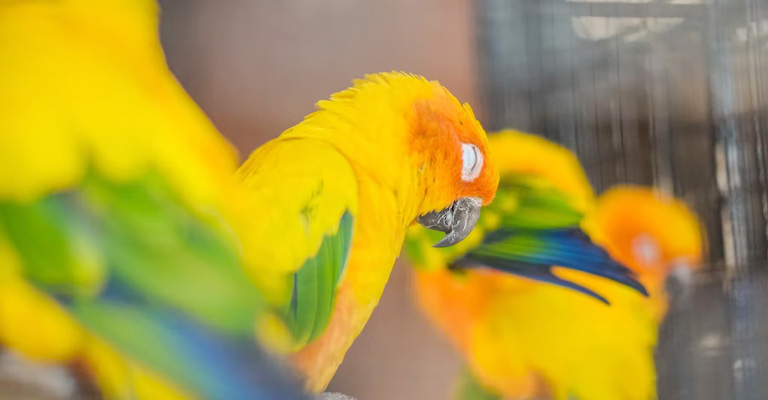
Now let’s discuss effective treatment options for conure head bobbing-
Environmental Enrichment
Providing a stimulating environment can help alleviate head bobbing in conures. Offer a variety of toys, perches, and activities that encourage mental and physical engagement. This can divert their attention from repetitive behaviors like head bobbing.
Regular Exercise
Conures are active birds that exercise regularly to maintain their physical and mental well-being. Ensure your conure has ample out-of-cage time to fly, play, and explore under supervised conditions. Physical activities can reduce stress and decrease the likelihood of excessive head bobbing.
Diet And Nutrition
Proper nutrition plays a vital role in a conure’s overall health. Please consult an avian veterinarian to ensure your conure receives a balanced diet suitable for its species.
A well-rounded diet can contribute to a healthy hormonal balance, potentially reducing head bobbing associated with breeding behavior.
Veterinary Consultation
If your conure’s head bobbing persists or is accompanied by other concerning symptoms, it is crucial to seek veterinary advice.
An avian veterinarian can thoroughly examine, run diagnostic tests, and determine if any underlying health issues contribute to the behavior. They may recommend specific treatments or medications based on the diagnosis.
FAQ
No, not all conures bob their heads. Some conures may do it more often than others, depending on their personality, mood, and environment. Some conures may only do it sometimes.
By looking at your bird’s context and other body language cues, you can tell if your conure is happy or unhappy when it bobs its head. For example, if your conure shakes its head in a friendly and relaxed manner, with bright eyes and relaxed feathers, it may be happy. It may be unhappy if your conure bobbed its head excessively or frantically, with dilated pupils and ruffled feathers.
Yes, head bobbing can be contagious among conures. Conures are social birds that mimic each other’s behaviors and sounds. If one conure shakes its head for any reason, another conure may join in out of curiosity or solidarity.
You can teach your conure to bob its head on command. Conures are intelligent birds that can learn how to perform tricks using positive reinforcement. You can use a clicker and treats to train your conure to bob its head when you say a cue word or make a gesture.
You can stop your conure from bobbing its head if it is causing problems for your bird or yourself. However, you should not try to stop it if it is normal and harmless behavior for your bird. You should understand why your bird is bobbing its head and address the underlying cause if necessary.
Conclusion
Conures are wonderful pets that can bring joy and laughter to your home. They are also expressive and communicative birds that use their body language to convey their feelings and intentions.
Head bobbing is one of the most common and expected behaviors for conures and many other parrot species. Depending on the context, the individual bird, and its mood, it can mean different things.
In this article, we have explained some possible reasons why conures bob their heads, how to interpret their body language, and what to do if you suspect something is wrong with your feathered friend. We hope you have found this information valuable and informative.